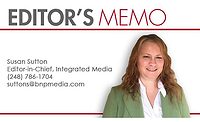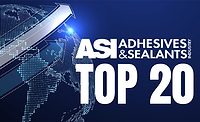2019 ASI Top 20 Adhesives and Sealants Manufacturers List
To develop the 2019 ASI Top 20 ranking of leading global adhesives and sealants manufacturers, we worked diligently to target company details focused specifically on adhesives and sealants.

Welcome to the ASI Top 20, our annual feature detailing the leading worldwide manufacturers of adhesives and sealants. To develop the ranking, we worked diligently to target sales figures (and other details) focused specifically on adhesives and sealants.
We would like to extend an enormous thank you to those who responded to our requests and provided these details. We understand that it involves a degree of effort, as well as trust in some cases, to compile and send this information, and we truly appreciate your participation. Your cooperation will help us continue to improve the quality of the list, ensuring its ongoing use as a global resource about and for the adhesives and sealants industry.
In addition to information supplied by company contacts, we gathered details from annual reports, company websites, press releases, and other sources. In cases where organizations did not respond to our requests or declined to provide adhesives/sealants-focused information, and reasonable estimates could not be made based on publically available information, some companies did unfortunately have to be left out.
If you would like your company to be considered for the 2020 ASI Top 20, or if you have any questions or suggestions for future rankings, please contact Susan Sutton, editor-in-chief, at (248) 786-1704 or suttons@bnpmedia.com.
Note to reader: Click on a listing to learn more about the company
View All of the 2019 ASI Top 20

Henkel’s new high-tech aerospace adhesives facility in Spain was reportedly designed as a smart operations site and exceeds the high standards for quality and safety in the aerospace industry.
Düsseldorf, Germany
CEO: Hans Van Bylen
Adhesive Technologies Board Member: Jan-Dirk Auris
Henkel’s Adhesive Technologies business unit delivered sales of over €9.4 billion (approximately $10.6 billion) in 2018, representing organic growth of 4% compared to 2017 (including foreign exchange effects, sales were relatively flat with a 0.2% increase). The Adhesive Technologies division represents almost half (47%) of Henkel’s total sales; the company’s other two divisions include Beauty Care (20% of total sales) and Laundry & Home Care (32%).
Adhesive Technologies is organized into two business areas: Industrial; and Adhesives for Consumers, Craftsmen and Building. Within the Industrial segment, sales growth for 2018 was reported in the Packaging and Consumer Goods Adhesives, Transport and Metal, General Industry, and Electronics businesses. Adhesives for Consumers, Craftsmen and Building also delivered increased sales last year.
Henkel employed approximately 53,000 people in 2018, with the Adhesive Technologies business representing about half of that number (~ 26,000); the adhesives business operated approximately 141 production sites around the world. Adhesive Technologies spent about €281 million (~ $315.3 million) on research and development in 2018, representing 58% of Henkel’s overall R&D expenditures.
Henkel’s Adhesive Technologies business started construction and/or opened several new facilities in the past year. In September 2018, the company laid the corner stone for a new global innovation center in Düsseldorf, Germany. Once construction is completed (planned for the end of 2020), the facility will allow more than 350 experts to develop new technologies and applications for a variety of industries. Henkel reports that the building will also serve as a global customer center where new solutions for adhesives, sealants, and functional coatings will be presented.
“Innovations are an integral part of our corporate strategy,” said Hans Van Bylen, CEO. “They drive our growth. That is why we are making this targeted investment in innovation and growth. This particular investment is also a strong commitment to our hometown, Düsseldorf, which is one of our largest research, development, and production sites worldwide.”
In March, Henkel announced a new Technical Center of Excellence for Flexible Packaging Adhesives and Coating Applications in Bridgewater, N.J., which is expected to open later this year. Focused primarily on LOCTITE® adhesive and coatings, the new center will include labs for evaluation, design and testing, full-scale equipment, and state-of-the-art customer training facilities.
Also this past spring, Henkel opened its new OEM Application Center in Rocky Hill, Conn. “The OEM Application Center further advances our strategy to be a full solutions provider to our customers, especially within the industrial assembly sector,” said Ken Forlenza, head of industrial assembly and automotive aftermarket, North America. “With its advanced technology and automation, and investment in top-of-the-line equipment, we can more rapidly design and evaluate our innovative and reproducible customer processes.”
Henkel officially inaugurated its new production facility for aerospace applications in Montornès del Vallès (Montornès), Spain, in June. With an investment of about €35 million (~ $39.4 million), the company aims to use the facility to serve the constantly growing demand for high-performance solutions supporting key trends in the global aerospace industry, such as lightweighting, fuel efficiency, and automation.
“Aerospace is a very attractive growth market for us, because the global demand for new passenger aircrafts is expected to double over the next 20 years,” said Jan-Dirk Auris, executive vice president of Henkel Adhesive Technologies. “With the new high-tech facility, we significantly expand the capacities for our leading high-impact solutions that are specified on all major aircraft platforms and increase our capabilities to develop next-generation materials for future programs. At the same time, we enlarge our global production and distribution network and enhance the proximity to our strong customer base in Europe.”
Henkel is actively pursuing growth opportunities in the additive manufacturing space. Last June, the company’s Innovation and Interaction Center (IIC) for 3D printing was opened at its Tallaght site near Dublin, Ireland. The IIC, which is reportedly the first in a new generation of global industrial customer centers, is Henkel’s European regional hub for technology presentations, demonstrations, training, and testing, as well as customer service for 3D printing.
Earlier this year, Henkel announced that it had joined Origin’s open materials platform, reportedly to further drive the adoption of 3D printing technologies beyond prototyping to final parts production. The agreement combines Henkel’s materials expertise with Origin’s printer and software know-how.
“Our engineering resins respond to some of the most severe limitations for additive manufacturing at scale,” said Philipp Loosen, Henkel’s head of 3D Printing. “We have determined that Origin’s novel programmable photopolymerization technology (P3) offers a complementary technology for our high-performance materials.”
Henkel announced in May its acquisition of U.S.-based Molecule Corp., a privately owned, technology-driven enterprise focused on product innovation in additive manufacturing. Molecule provides advanced solutions for 3D printing applications (including medical devices, aerospace, automotive, and a variety of consumer goods) and industrial inkjet materials.
“Molecule Corp. and Henkel are an excellent fit,” said Loosen. “Molecule’s strong 3D printing and inkjet resin technologies and digital development capabilities perfectly complement and strengthen our materials portfolio and build on our approach to offer a comprehensive range of customized additive manufacturing solutions.”
Sources: company contact, annual report, press releases
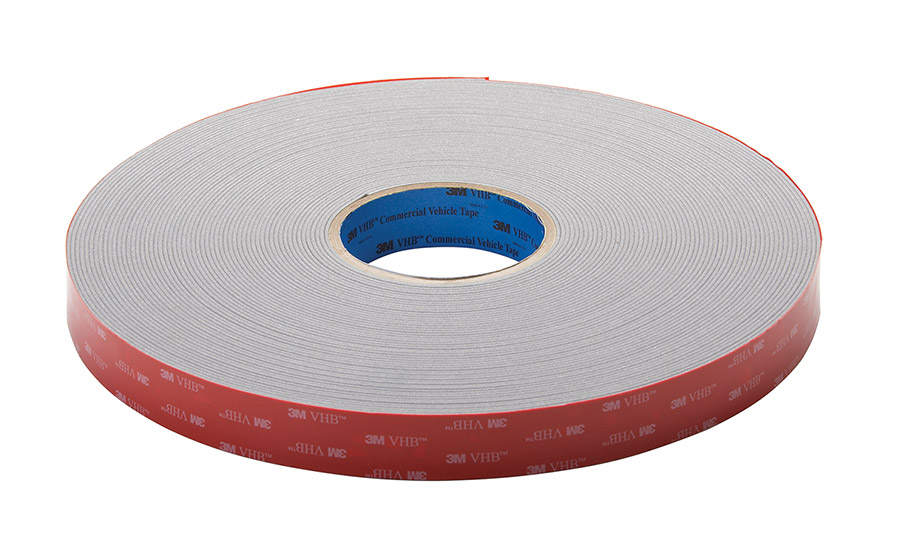
In May, 3M announced that its commercial vehicle product line expanded with the addition of CV90F to the 3M™ VHB™ commercial vehicle tape family.
St. Paul, Minn.
CEO: Mike Roman
3M reports its financial results according to end-use segments (vs. product segments), which makes determining its adhesives and sealants-related sales and other details difficult. (The company did not respond to requests for adhesives/sealants-specific information.) However, its 2018 annual report provides “disaggregated revenue information” that details 2018 net sales for Adhesives and Tapes within its Industrial business group of $4.6 billion, a 3% increase over 2017.
Various types of adhesives, sealants, tapes, films, and perhaps additional related products are sold through the company’s other business segments as well. These segments include Safety and Graphics, Health Care, Electronics and Energy, and Consumer.
In March, 3M announced a company realignment from those five business segments to four: Safety and Industrial, Transportation and Electronics, Health Care, and Consumer. Reflecting a slower-than-expected start to 2019, 3M announced in April that it would initiate restructuring and other actions that will result in an expected reduction of 2,000 positions worldwide, with an estimated annual pre-tax savings range of $225 million to $250 million, with $100 million in the remainder of 2019.
“While we take actions to manage through the near-term, we also continue to invest in growth to position 3M for the future,” said Mike Roman, CEO. “We recently implemented a significant portfolio realignment from five to four business groups, which will enable us to better serve our customers and global markets. Moving forward, I am confident that we are making the necessary changes and focused on the right priorities to accelerate 3M into a stronger future.”
3M has a longstanding commitment to sustainability, from the Pollution Prevention Pays program that began in 1975 to its 2025 sustainability goals that include water, climate, and energy targets. In September 2018, 3M announced that it had been selected for inclusion in the 2018 Dow Jones Sustainability Index (DJSI) for the 19th consecutive year.
“Our commitment to helping solve global challenges is at the core of everything we do at 3M,” said Gayle Schueller, vice president and chief sustainability officer. “We’re a purpose-driven company committed to sustainability-inspired innovation, using our science and technology to improve lives around the world.”
3M announced in December 2018 that, beginning this year, all new products it launches will be required to have a Sustainability Value Commitment that demonstrates how the product drives impact for the greater good. “As a large and diverse global science company with customers spanning many industries and global markets, we have the opportunity to make an even greater impact in sustainability,” said Schueller.
This past February, 3M announced its commitment to move to 100% renewable electricity in all its facilities around the world, beginning with its headquarters in St. Paul, Minn. 3M’s transition to 100% renewable electricity at its headquarters will increase the company’s total global renewable electricity sourcing by more than 5% to approximately 30% and further help the company reduce greenhouse gas emissions. 3M has recorded a 68% absolute reduction in greenhouse gas emissions since 2002 while nearly doubling its revenue.
Committing to 100% renewable electricity is reportedly part of 3M’s strategic focus on science for climate with the aspiration to innovate to decarbonize industry, accelerate global climate solutions, and improve the company’s environmental footprint. As part of that goal, 3M joined RE100, a global leadership initiative led by The Climate Group in partnership with Carbon Disclosure Project (CDP), that brings together influential businesses committed to sourcing 100% renewable power for their worldwide operations.
“By joining RE100 and switching to 100% renewable electricity globally, 3M is building sustainability into its business growth strategy and showing the two go hand-in-hand,” said Helen Clarkson, CEO of The Climate Group. “Seeing such a large manufacturer commit to ‘go all in’ on renewables to produce sustainable new products is an encouraging step forward. Big brands like this can influence positive action from other companies and customers and accelerate the clean energy transition around the world.”
Sources: annual report, company website, press releases
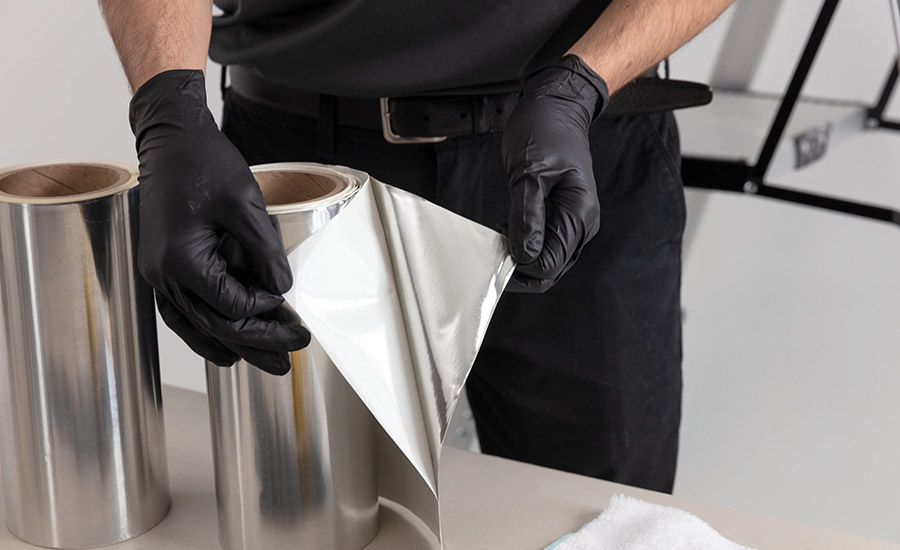
In April, Avery Dennison announced the availability of its ShieldSense™ RFID blocking material, which is installed by peeling back the liner 1-2 in. while unrolling the material.
Glendale, Calif.
President, CEO, and Chairman of the Board: Mitch Butier
Avery Dennison operates in three main business groups: Label and Graphic Materials (approximately $4.9 billion in sales in 2018, representing 68% of total sales), Retail Branding and Information Solutions ($1.6 billion, 22%), and Industrial and Healthcare Materials ($695 million, 10%). The company’s total sales in 2018 reached nearly $7.2 billion, an increase of over 8% compared to 2017. (Avery Dennison declined to provide adhesives/sealants-specific sales figures and other details.)
Around 30,000 people in 50+ countries work for Avery Dennison. Though the company approved a restructuring plan in April 2018 that included a facility closure in Europe and the subsequent elimination of about 400 positions, personnel additions in other locations are expected to result in a net reduction of around 150.
Avery Dennison increased its spending on R&D by about 4.9% in 2018, increasing from 2017’s $93.4 million to $98.2 million. (Adhesives/sealants-specific R&D spending figures are not available.)
In July 2018, Avery Dennison, L’Oréal Australia, and waste management company Wasteflex announced a collaboration on a recycling program to deliver zero waste to landfills. Avery Dennison’s liner recycling program reportedly supports the company’s sustainability goal to help customers reduce waste from its products. The companies expect that the liner recycling program will help brands divert glassine paper liner (waste from label application process) from landfills into recycled products. Through this program, L’Oréal Australia will divert over 6 t of glassine paper liner in Australia into recycled paper for use in the recycled paper industry.
“As a materials science innovator committed to making a meaningful difference, we see sustainability as both a responsibility and an opportunity to lead,” said Anil K. Sharma, vice president and general manager for Label and Graphic Materials in South Asia Pacific and Sub-Saharan Africa for Avery Dennison. “With our liner recycling program, brands now have a solution that will enable them to reduce the environmental impact from discarded label liner waste. We are delighted to partner with L’Oréal Australia and Wasteflex on this sustainability journey.”
“The savings from this program have been significant, but the biggest benefit for L’Oréal Australia is being able to meet our zero waste to landfill through the services and expertise of Wasteflex and Avery Dennison,” said David O’Leary, national logistics manager for L’Oréal Australia.
This past April, Avery Dennison officially opened its first intelligent label innovation space in the Asia-Pacific and Sub Saharan Africa region. The new Avery Dennison I.Lab™, located in Pune, India, is an interactive facility that provides customers and partners with hands-on experiences, live demonstrations, and technical support to help converters and partners explore the opportunities surrounding intelligent label solutions and RFID adoption.
“We are thrilled to be the third global I.Lab™ in India,” said Pankaj Bhardwaj, senior director and general manager of Avery Dennison, South Asia. “Through I.Lab, we are well-positioned to advance the creation, delivery and adoption of intelligent label solutions for businesses in various industries.”
Modeled after the first concept lab in Oegstgeest, Netherlands, this new facility will reportedly demonstrate how Avery Dennison’s intelligent labeling solutions can bring items to digital life. By connecting the physical and digital world through item-level digital identities, businesses can benefit from improved inventory management and increased efficiencies throughout the supply chain.
Sources: annual report, company website, press releases
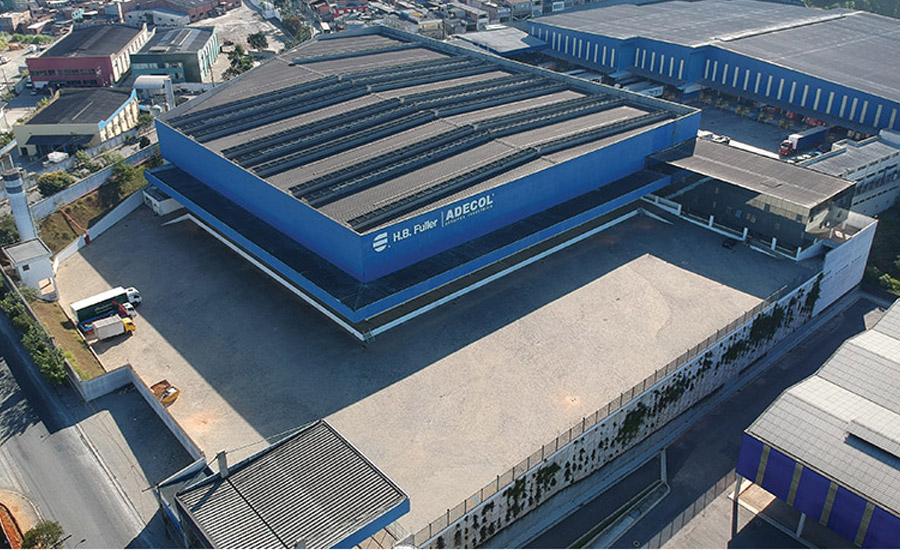
H.B. Fuller’s new facility in Brazil will reportedly enable the development of new products and includes space for a future showroom.
St. Paul, Minn.
CEO: Jim Owens
Described by a company contact as “a pure-play global adhesives provider,” H.B. Fuller achieved over $3 billion in revenue in 2018. This represents an increase of almost 32% compared to 2017’s $2.3 billion, primarily as a result of acquisitions (28.3%) and product pricing (3.4%). (H.B. Fuller finalized its acquisition of Royal Adhesives & Sealants in late 2017.) The company had approximately 6,500 employees at the end of 2018.
H.B. Fuller is organized around five business segments: Americas Adhesives (representing 36% of total 2018 revenue), EIMEA (Europe, India, Middle East, and Africa; 24%), Asia Pacific (9%), Construction Adhesives (15%), and Engineering Adhesives (16%). The three regional segments produce adhesives for a range of markets, including assembly, packaging, performance wood, and insulating glass. Construction Adhesives focuses on applications such as tile setting, commercial roofing, and HVAC. The Engineering Adhesives business provides high-performance industrial adhesives for industries such as transportation, electronics, and medical.
H.B. Fuller Japan G.K. was established in early 2019. The business is expected to strengthen H.B. Fuller’s Engineering Adhesives (EA) businesses in Japan by focusing on high-performance adhesives, including reactive adhesive chemistries and applications. It collaborates closely with the company’s joint venture business, Sekisui Fuller Co., Ltd. for sales and distribution channels.
In June, H.B. Fuller announced that it had signed a definitive agreement to sell its surfactants, thickeners and dispersants business to Tiarco, LLC, a wholly owned subsidiary of Textile Rubber and Chemical Company, Inc., for $71 million. The transaction is expected to close in the third quarter.
“The business being sold is a non-strategic, non-adhesive business, which was purchased as part of the Royal acquisition,” said Jim Owens, president and CEO. “Our focus is to shift our portfolio to more highly specified adhesive solutions, and the surfactants, thickeners and dispersants business is not part of our strategic vision. By divesting this business, we are able to continue to accelerate paying down debt, focus on our core, and better position this business for future growth under the ownership of Tiarco, which specializes in this market. We are pleased that our colleagues will join a strong, established team at Tiarco.”
Also in June, H.B. Fuller inaugurated a new business space in Brazil that the company says will serve as the strategic point of adhesive solutions distribution throughout Latin America. After its acquisition of Adecol in 2017, H.B. Fuller reports that it recognized that the old plant needed expanding to accommodate the company’s expected growth in Latin America. The larger, technically advanced new space reportedly enables the development of new products and includes space for a future showroom where customers will be able to see adhesive performance in practice.
According to H.B. Fuller, the space is designed to foster collaboration and drive innovation through an open concept design. Because the departments are integrated, information is more easily communicated, resulting in overall faster customer response times. In addition, the new space is equipped to facilitate customer training in an effort to improve the level of application knowledge in the industry.
Sources: company contact, annual report, press releases
Medina, Ohio
Chairman and CEO: Frank C. Sullivan
RPM reported total sales of $5.3 billion in its 2018 fiscal year, ended May 31, 2018 (the company declined to provide specific adhesives/sealants-related details). Tremco, illbruck, and Universal Sealants are among the brands in the company’s Industrial segment, which delivered over $2.8 billion in fiscal 2018 (53% of total sales). The Consumer segment reached almost $1.8 billion in sales for the year (33% of total) and includes Rust-Oleum and DAP, among others.
In March 2018, RPM announced that its Rust-Oleum Group had acquired Miracle Sealants Co. At the time, the company reported that Miracle Sealants had annual net sales of around $25 million.
RPM announced this past June that its Tremco business had acquired Schul International Co., LLC, a manufacturer of joint sealants for commercial construction, as well as Willseal LLC, a business that markets and sells Schul products. Both companies are headquartered in Hudson, N.H., and have combined annual net sales of approximately $15 million. They are being integrated into the Tremco Commercial Sealants & Waterproofing business.
“The acquisition of Schul strengthens Tremco’s position as a global market leader and puts RPM in a leading position for impregnated foam tape technology,” said Frank C. Sullivan, CEO.
Sources: company contact, annual report, press releases
Colombes, France
Chairman and CEO: Vincent Legros
Parent Company: Arkema
Bostik, which operates within Arkema’s High Performance Materials business segment, reports that it has annual sales of €2 billion (~ $2.2 billion) and employs 6,000 people in 50 countries. (The company did not respond to requests for specific information related to 2018 sales figures, etc.) Arkema’s goal is to grow Bostik’s sales to around €3.2 billion (~ $3.6 billion) by 2023, which would represent one-third of the group’s total sales.
In August 2018, Bostik completed its acquisition (through the Bostik-Nitta joint venture that is majority-owned by Bosik) of the industrial adhesives business of Nitta-Gelatin Inc. Bostik expects that the acquisition, representing sales of around €30 million (~ $33.6 million), will support development efforts for fast-growing markets such as electronics and automotive.
Bostik simultaneously announced that the Bostik-Nitta joint venture would build a new world-scale plant featuring several production lines dedicated to adhesives for the nonwoven market for hygiene applications, as well as for the industrial adhesives markets. The new facility, to be located in Nara, Japan, should come on stream in early 2020.
In October, Bostik announced its acquisition of Afinitica, a Spain-based cyanoacrylate manufacturer. The company expects that this small targeted acquisition will expand its existing range of assembly adhesives while also speeding up the development of its offerings for the durable goods markets.
Sources: annual reports, company websites, press releases
Baar, Switzerland
CEO: Paul Schuler
Sika reports its financial results according to geographic region, not business or product segment, but it sells adhesives and sealants (among many other products) into almost all of its strategic markets, such as Waterproofing, Flooring, Sealing & Bonding, Industry, and Refurbishment. (The company did not respond to requests for specific adhesives/sealants results details.)
In a presentation for investors, Sika represented its total 2018 sales of CHF 7.1 billion (~ $7.3 billion) as being 77% for construction and 23% for industry. It allocated sales for the year to: Thermoplastic Systems (28%), Adhesive Systems (26%, or around CHF 1.8 billion/~ $1.9 billion), Concrete Systems (17%), Mortars (15%), and Coating Systems (14%).
Sika announced this March that it had agreed to acquire Belineco LLC, a Belarus-based manufacturer of polyurethane foam systems. The acquired business generates annual sales of CHF 23 million (~ $23.5 million). With its geographical footprint focused on Eastern Europe, the acquisition complements the Swiss-based Polypag polyurethane foam business Sika acquired in July 2018. Sika expects that its acquisition of Belineco will enhance its product offering for trade distribution channels and improve store penetration with larger distributors.
Sika completed its acquisition of Parex this past May. With annual sales of CHF 1.2 billion (~ $1.2 billion), Parex’s product offering includes facade mortars, tile adhesives, and waterproofing mortars. The company has a particularly strong presence in distribution channels, especially in China, where it has built up a network of over 90,000 points of sale. Parex is locally present in 23 countries, with key positions in eight core markets, and operates 74 plants around the world.
Sika reports that the acquisition of Parex will strengthen its growth platform. Sika’s mortar business, which is a key growth technology for the group, will more than double in size. Parex will gain access to Sika’s well-established direct sales channels, and Parex’s expertise in the facade and tile setting business will allow Sika to participate in these growing and attractive market fields.
Sources: annual report, company website, company investor presentation, press releases
Tokyo, Japan
President and CEO: Hiroyuki Nishio
LINTEC operates with three main business groups: Printing and Industrial Materials Products, which produces adhesive papers, tapes, films, and other products; Electronic and Optical Products, which makes semiconductor- and multilayer ceramic capacitor (MLCC)-related tapes, as well as other products; and Paper and Converted Products. Mactac (listed separately) is part of LINTEC’s Printing and Industrial Materials Products segment (see note).
LINTEC’s total sales were relatively flat in its 2019 fiscal year, which ended March 31, 2019. Sales of tapes and optical display-related adhesives in the Electronic and Optical Products segment were mixed, with semiconductor tapes seeing a dip and MLCC tapes increasing. Sluggish demand affected display adhesives in the fiscal year’s second half, but television-related products were strong for the year.
Editor’s note: As Mactac provided adhesives/sealants-related details and requested that they be kept confidential, specific sales levels for LINTEC will likewise not be published to avoid any conclusions potentially being drawn. Mactac’s sales were subtracted when determining LINTEC’s ranking.
Sources: company website, company results presentation and summary
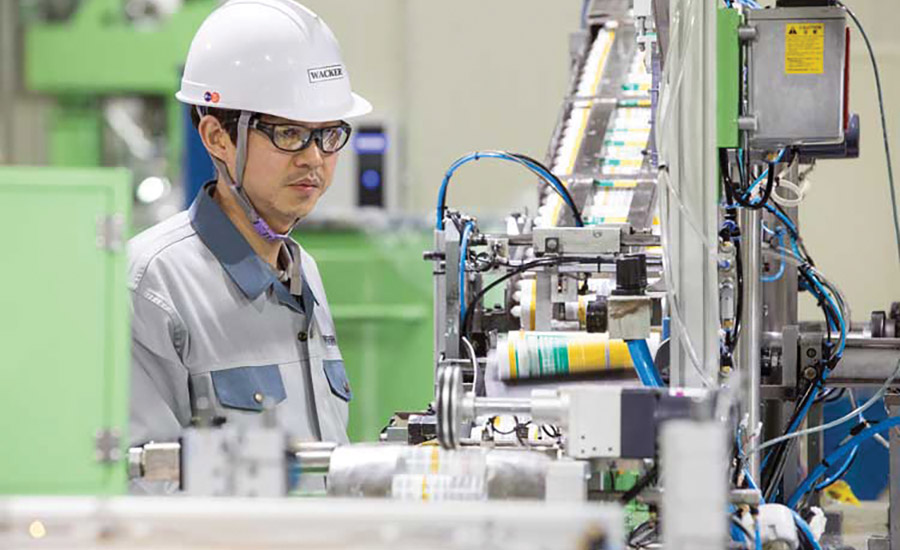
An employee fills cartridges with silicone sealant at the new site that Wacker opened last April in Jincheon, South Korea.
Munich, Germany
President and CEO: Rudolf Staudigl, Ph.D.
Wacker’s business comprises four main divisions: Wacker Silicones, Wacker Polymers, Wacker Biosolutions, and Wacker Polysilicon. The group’s total sales in 2018 topped €4.9 billion (~ $5.7 billion), while Wacker Silicones delivered almost €2.5 billion (~ $2.8 billion), an increase of more than 13%. The division produces sealants, resins, and elastomers, as well as a multitude of additional silicone-based products and materials; it had over 5,100 employees at the end of 2018. (The company did not respond to requests for specific adhesives/sealants details.)
In April 2018, Wacker opened a new production site in South Korea. The company had produced silicone sealants in Jincheon since 2010 and manufactured specialty silicone elastomers there for the electronics industry since 2012. “Due to the strong growth in demand for our silicones, production was increasingly being stretched to its limits,” said Auguste Willems, executive board member.
According to the company, the centerpiece of the new site is a 13,000-sq-m production building. Silicone sealants for the construction industry and specialty silicone elastomers for electronic applications are manufactured in separate facilities. The production lines have reportedly been equipped with cutting-edge manufacturing technology that enables fully automatic and efficient production processes. Hyper-pure silicones are produced and packaged in a dedicated cleanroom, which is a service that is becoming increasingly important for customers in the electronics industry, in particular.
“The opening of our new plant is a milestone for us and sends a signal to our customers that we want to continue growing in Asia and in South Korea especially,” said Christian Hartel, executive board member, at the opening ceremony. “We generate around 40% of our sales in Asia. Our operations in South Korea play a key role here. Our new production site enables us to strengthen and expand our position in the region over the long term.”
Sources: annual report, company website, press releases
Glenview, Ill.
Chairman and CEO: E. Scott Santi
Illinois Tool Works (ITW) manufactures adhesives, sealants, and coatings within its Polymers & Fluids business segment (the segment also produces lubrication and cutting fluids, and fluids and polymers for the automotive aftermarket), as well as pressure-sensitive adhesives in its Test & Measurement and Electronics segment (which also offers a wide range of products unrelated to adhesives and sealants).
Revenue for the Polymers & Fluids division was flat in 2018 compared to 2017, at $1.7 billion (the company did not respond to requests for specific adhesives/sealants-related details). A 1% increase in organic revenue was offset by unfavorable currency translation. In the Test & Measurement and Electronics segment, ITW reports that the part of the business that includes pressure-sensitive adhesives (along with contamination and static control products) saw organic revenue increase by 5% in 2018, due to increasing North American demand related to the semiconductor market.
Sources: annual report, company website
The Woodlands, Texas
Chairman, President and CEO: Peter R. Huntsman
Huntsman’s Advanced Materials segment produces adhesives and other products for applications in transportation, electrical/electronics, construction, and more. (The company did not respond to requests for specific adhesives/sealants details.) In total, the segment produced 12% of Huntsman’s overall revenue of $9.4 billion in 2018, or approximately $1.1 billion. This represents an increase of 7% compared to 2017, primarily due to higher average selling prices; volumes were essentially flat for the year.
In August 2018, Huntsman announced that it had opened a multi-purpose facility at the Amata Vietnam Industrial Park, near Ho Chi Minh City, Vietnam. The site, a greenfield investment, houses Huntsman’s Polyurethanes and Advanced Materials businesses, and comprises manufacturing, R&D capabilities, a technical service center, warehouse and distribution space, and a commercial office.
“This is the first manufacturing expansion investment outside China for our business in Asia-Pacific and we see many opportunities in Vietnam to support large-scale infrastructure and construction projects in one of the fastest growing economies in the region,” said Scott Wright, president of Advanced Materials.
Sources: annual report, company website, press releases
Mumbai, India
Chairman: Madhukar Parekh
By many accounts, Pidilite is the largest adhesives manufacturer in India. The company operates in three main segments, Consumer & Bazaar Products (includes products such as joinery adhesives, sealants, and tapes), and Industrial Products (industrial adhesives for packaging, footwear, and automotive; industrial resins; and other products), and Other (specialty acetates).
Pidilite’s total fiscal year 2019 sales (ended March 31, 2019) grew over 14% to Rs 6048.2 cr (~ $909 million), compared to the prior year. (Specific adhesives/sealants details were not available.) In the prior fiscal year, Consumer & Bazaar Products represented 84% of total sales, while Industrial Products was 15%. Sales in the 2019 fiscal year for Consumer & Bazaar Products rose more than 15%; Industrial Products saw a 9% increase.
Sources: company investor update, company website
Cary, N.C.
President and CEO: Edward L. Auslander
LORD announced in January that it had reached the milestone of achieving annual sales of $1 billion (total sales; the company declined to provide adhesives/sealants-specific details). The company, which produces advanced adhesives, coatings, and specialty materials, as well as vibration and motion control technologies, has approximately 3,100 employees at 17 manufacturing and 15 R&D facilities in 26 countries.
This past April, Parker Hannifin Corp. announced that it would acquire LORD for approximately $3.7 billion in cash. The transaction has been approved by the boards of directors of each company and is subject to customary closing conditions, including receipt of applicable regulatory approvals. Upon closing of the transaction, LORD will be combined with Parker’s Engineered Materials Group.
“This strategic transaction will reinforce our stated objective to invest in attractive margin, growth businesses, such as engineered materials, that accelerate us toward top-quartile financial performance,” said Tom Williams, chairman and CEO of Parker. “LORD will significantly expand our materials science capabilities with complementary products, better positioning us to serve customers in growth industries and capitalize on emerging trends such as electrification and lightweighting.”
“With complementary business segments, coming together with Parker enables LORD to carry out our grander vision,” said Ed Auslander, president and CEO of LORD. “Parker is already a large tier one supplier in many areas, allowing our business lines immediate access to growth, additional markets, applications and new customers. In addition, the two companies are very much aligned when it comes to core values, great business acumen and cultural fit.”
In October 2018, LORD unveiled a new manufacturing facility for electromechanical solutions in Pont de l’lsère, France. The 83,000-sq-ft facility replaced the company’s previous facility in Saint-Vallier, with all 200 employees relocating to the new building.
LORD announced this spring that it had invested €14 million (~ $15.8 million) as part of plans to expand operations at its location in Hückelhoven, Germany. A new adjacent building, which will add about 3,200 sq m of production and office space to the existing facility, is expected to be complete and operating by mid-2020. Gap fillers, potting and encapsulants, and thermal adhesives will be produced at the site.
Sources: company website, press releases
Detmold, Germany
CEO: Rainhard Kramme
Jowat is celebrating its 100th anniversary in 2019. The company produces industrial adhesives for applications in industries such as woodworking and construction, packaging, automotive, graphic arts, and more. Manufacturing is carried out at three sites in Europe, as well as at Jowat Corp. in North Carolina (the company’s largest subsidiary) and Jowat Manufacturing in Malaysia. Jowat also has 23 affiliated sales offices/distributors located around the world.
In May last year, Jowat announced that it had opened a subsidiary in Bangkok, Thailand. This sixth sales company for Jowat in the Asia-Pacific region follows locations in China, Malaysia, Vietnam, Australia, and the United Arab Emirates.
“As the most ‘mature’ market in the Asia-Pacific region, Thailand is of outstanding importance to us,” said Ralf Schelbach, Ph.D., Jowat’s vice president for Asia-Pacific. “The country has a highly qualified workforce and labor costs at a competitive level. We look forward to having a direct point of contact for customers in this country as well.”
Sources: company contact, company website, press release
Dublin, Ohio
Chairman and CEO: William A. Wulfsohn
Ashland employs approximately 6,000 people total and operates its Adhesives division within the Industrial segment of its Specialty Ingredients business; Specialty Ingredients overall achieved $2.5 billion in sales in 2018. According to a company source, sales for Adhesives grew in 2018, topping approximately $350 million; sales growth is expected to continue. Ashland invested around $30 million in adhesives-related R&D in 2018.
The company’s other divisions include Composites ($942 million in sales in 2018) and Intermediates and Solvents ($331 million). In its second quarter 2018 financial release last May, Ashland shared its intention to re-focus its portfolio on specialty materials. Toward that end, the company announced plans to reduce expenses/costs by $120 million.
“As we work to position Ashland with a more streamlined portfolio focused on specialty ingredients, we are also taking the opportunity to create a leaner, more competitive cost structure,” said William A. Wulfsohn, chairman and CEO. “Under this program, we will be taking action to drive fundamental change across our global organization and redefine how our teams work together. We believe these actions will speed decision making, improve operating efficiency and drive a more customer-centric organization while lowering costs.”
In November, Ashland announced that it had signed a definitive agreement to sell its Composites business and a butanediol (BDO) manufacturing facility in Marl, Germany, to INEOS Enterprises in a transaction valued at approximately $1.1 billion. The Composites unit supplies unsaturated polyester resins, vinyl ester resins, and gel coats; the BDO facility in Germany, as well as related merchant products included in the agreement, are part of Ashland’s Intermediates and Solvents segment. The transaction was expected to close prior to the end of the June 2019 quarter.
“Composites and Marl are outstanding businesses with strong market positions and high-performing teams,” said Wulfsohn. “At the same time, the divestiture of these businesses is consistent with Ashland’s vision of becoming the premier specialty chemicals company. With a more streamlined and focused product portfolio, improved margins and reduced earnings volatility, Ashland will be better positioned to deliver sustained earnings growth and unlock significant value for shareholders. Over the past two years, we have taken specific actions to sustain and grow Ashland’s premium mix while also improving our competitiveness, particularly within Specialty Ingredients.”
Sources: company contact, annual report, press releases
Stow, Ohio
CEO: Edward LaForge
Parent Company: LINTEC Corp.
Celebrating its 60th anniversary this year, Mactac had approximately 500 employees at the end of 2018. According to Janet Page, senior marketing manager, the company’s new technology developments in 2018 led to a shift in demand toward higher value products. “Mactac’s innovation in adhesive formulation has led to increasing demand for our tape and label products, so because of the demand, we are building on the success of our new product developments,” she said. “For example, in our tape business, we have seen the market shift demand from traditional mechanical fasteners toward pressure-sensitive solutions.”
Mactac has reportedly expanded significantly both throughout North America and internationally. Most recently, after being purchased by LINTEC Corp. in 2016 (see note), the company has seen growth in numerous global markets and is continuously expanding its product lines.
“I’m extremely proud of all Mactac has accomplished throughout the past 60 years,” said Ed LaForge, president. “Our leadership team has always believed in doing whatever it takes to be a reliable partner for our customers, community, and employees and that’s a mentality that will endure throughout the next 60 years. As we look to the bright future with LINTEC, we will continue to grow, produce and create innovative products using the best technology and resources available to meet the growing needs of the global pressure-sensitive adhesive industry.”
Earlier this year, Mactac was named a recipient of the 2019 Evolution of Manufacturing Award from Smart Business. The award reportedly recognizes northern Ohio manufacturers and technology companies that have adapted to a global economy through improved operations, products, or services. Mactac was nominated to receive the award by customer Omni Systems Inc. As part of the award selection criteria, information was provided on the evolution of Mactac’s manufacturing operations, the impact of its manufacturing operations on product growth and development, and more.
In April, Mactac announced a new association with Canon Solutions America, Inc. With Canon’s rising customer demand for increased vendor options of roll-to-roll self-adhesive vinyl materials, the two companies have been working to build an approved portfolio of products for use on the Océ brand Colorado 1640 printer. After thorough testing, the association has resulted in an offering of pressure-sensitive graphic materials for wall, window, and floor applications, as well as a selection of overlaminates.
“We are excited that we have found an associate in Mactac that has provided a wide range of materials for approval for use on the Océ Colorado 1640,” said Bob Honn, senior director of Marketing for Canon Solutions America. “From indoor and outdoor walls to floors, these products will help wide-format Colorado users grow their pressure-sensitive business in the areas of labels, floor, window, and wall graphics.”
Editor’s note: Details for LINTEC are included separately.
Sources: company contact, press releases
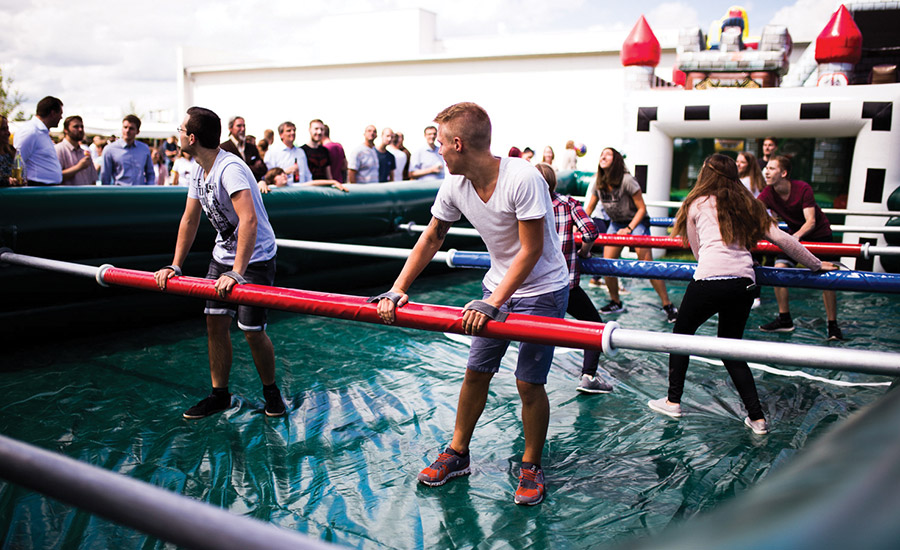
Family Day at DELO Industrial Adhesives, which was named a Great Place to Work in Germany.
Windach, Germany
Managing Director: Robert Saller
Managing Partners: Sabine Herold, Wolf Herold
DELO produces industrial adhesives for high-tech industries such as automotive, aerospace, and electronics. In its 2018/2019 fiscal year (ended March 31, 2019), the company achieved revenues of €156 million (~ $174.9 million).
“While revenues for the 2018/19 fiscal year are down 1.9% on the previous year, we are entirely happy since we again succeeded in achieving sustained profitability,” said Wolf Herold, managing partner. “This slight decrease reflects the recent downturn in the global economy and the fact that the last year had also been characterized by dynamic growth with many special large-scale projects. Taken as an average, the last two years yield a rise of 28% respectively.”
DELO, which currently employs about 780 people worldwide, expects revenues to reach around €170 million (~ $190.6 million) for the current fiscal year. The company spent approximately 15% of its revenues on research and development last year, or around €23.4 million (~ $26.2 million).
In September 2018, DELO announced that it had inaugurated new headquarters for its business in China. In addition to the good infrastructure in the commercial district of Pudong New District, the decisive factor for the new location was reportedly the proximity to the previous branch and the resulting ability to retain employees.
“Our strong growing team in China, with their outstanding work, contributes significantly to being a sought-after partner for national and international customer projects,” said Robert Saller, managing director.
This past March, DELO announced that it had again been named a “Great Place to Work” in Germany, taking eighth place for its size category (501-1,000 employees) in the nationwide competition. The awards are based on a detailed anonymous survey of employees on key workplace issues such as trust in leaders, quality of cooperation, appreciation, identification with the company, compensation, and work-life balance. Of the total DELO employees surveyed, 82% said they were proud of DELO and their achievements together. In their overall assessment, 88% of respondents rated their company as a very good employer.
Company management was also surveyed as part of a cultural audit. “It makes us very proud that we have been honored as ‘Great Place to Work’ in each of our participations in the last 10 years,” said Sabine Herold, managing partner. “The award stands for our positive corporate culture and confirms our fair, open and respectful cooperation.”
Sources: company contact, company website, press releases
Greenville, S.C.
CEO: John A. (Lex) Reynolds
Parent Company: ITOCHU International, Inc.
Reynolds produces water-based adhesives and coatings, as well as hot-melt and dry-blend adhesives for industries ranging from automotive and packaging to graphic arts and assembly. In business since 1978, the company also provides custom tolling and private labeling services.
According to Lex Reynolds, CEO, the company’s revenues were essentially flat in 2018. He expects roughly the same for this year, with growth returning in 2020.
Sources: company contact, company website
City of Industry, Calif.
CEO: Brad Boyle
For over 55 years, General Sealants has specialized in the manufacture of extruded butyl sealants for applications in the aerospace, telecommunication, automotive, composites, HVAC, pipeline, highway, refrigeration, industrial manufacturing, RV and caravan, and construction industries. With product distribution in over 75 countries, General Sealants is reportedly one of the largest privately held extruded butyl sealant manufacturers in the world.
According to Patrick Boyle, president and chief operating officer, the company has a strong focus on innovation and strives to push the limits of sealant technologies. General Sealants’ commitment to higher education is demonstrated through donations and outreach to learning institutions that mirror the company’s passion for research and development.
“Along with the work performed in our R&D center, General Sealants is proud to support universities and technology centers around the world, including Massachusetts Institute of Technology (MIT), TU Graz Racing Team, UC Berkley Solar Vehicle Team, ETSEIB Motorsports, Colorado State University Energy Institute, and e-gnition Hamburg e.V.,” said Boyle.
Source: company contact
Alpharetta, Ga.
CEO: James Cooke
With approximately 220 employees, Chemence manufactures a range of consumer and industrial adhesives, as well as liquid photopolymers, impregnation sealants, and other resins. According to Michael Pomykala, global Marketing director, the company’s adhesives/sealants sales grew 35% in 2018 compared to the prior year; continued strong growth of 20% is projected for 2019.
In March 2018, Chemence announced its purchase of the electronics adhesive business of Georgia-based Supreme Resources, Inc., as well as the opening of Chemence Shanghai. The acquisition included adhesives technologies for consumer electronics (e.g., mobile devices and computers) and industrial electronics (e.g., electric vehicles and new energy). Chemence integrated the acquired electronics adhesive portfolio into its own Krylex® product line.
“Supreme Resources’ electronics adhesives business complements our existing adhesives technology portfolio outstandingly,” said James Cooke, CEO. “Their products add to Chemence’s growing platforms and provide us substantial opportunities to expand our presence in these markets immediately.”
Chemence Medical has observed significant traction in its wound closure business, according to Pomykala, with several recent product launches. U.S. Food and Drug Administration approvals in 2016 and 2017 have enabled the company to capture significant market share for topical skin adhesives. Growth is anticipated to continue moving forward, with several new product introductions, a new state-of-the-art automated production facility built in Alpharetta, and a strategic focus to continue expanding into emerging markets.
Sources: company contact, press release
Editor’s note: The ASI Top 20 is based, in part, on publically available financial information, including annual sales/revenue, along with details supplied by company contacts and other sources. Information was verified whenever possible, but adhesives/sealants-related details have been estimated in some cases. In other cases, details for privately held companies have been withheld on request. Financial figures are generally rounded, and the timing of currency conversions may impact specific figures/results.
Where specific and verifiable information was not provided and reference materials were not readily available, some companies unfortunately had to be left out. If you have questions or would like details regarding how to have your company considered for future ASI Top 20 rankings, contact Susan Sutton, editor-in-chief, at (248) 786-1704 or suttons@bnpmedia.com.
Looking for a reprint of this article?
From high-res PDFs to custom plaques, order your copy today!




